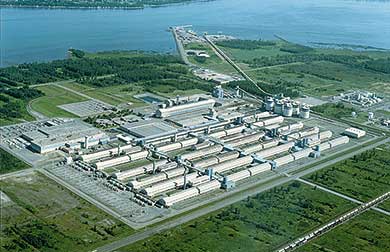Canada’s base-metal producers got a lift on Oct. 18 with the announcement of a preliminary free-trade agreement between Canada and the 28-member European Union that promises miners and metal producers a gradual elimination of tariffs on such big-ticket items as aluminum and iron ore, and a loosening of ownership and labour-mobility rules.
Canada’s Quebec-centred aluminum industry was perhaps most vocal with praise for what looks to be a big-business-friendly deal, with the Aluminum Association of Canada describing it as an “unprecedented growth opportunity” for the Canadian aluminum industry to “open the door to a large-scale market for Canadian aluminum production.”
The association says it’s likely the EU will eliminate tariffs on Canadian-produced aluminum, such as 7% on rods, 6% on billets, foundry and slabs, and 3% on remelt. Europe’s vast automobile-manufacturing market is particularly attractive to Canadian aluminum producers, who are competing with aluminum producers in the Middle East, where capacity has tripled in recent years.
The Mining Association of Canada called the Canada–EU deal a “significant step forward,” and said other tariffs due to be eliminated over time include: nickel and nickel products, where tariff rates are up to 3.3%; non-ferrous metals including copper, zinc, lead and tin, from rates of 3.1% to 9%; and iron and steel, from rates of up to 7%.
The MAC highlighted that the EU is Canada’s second-largest export market for Canadian metals, the third-largest for non-metals and the fourth-largest for mineral fuels. It noted that between 2010 and 2012, Canada exported an average of $20.4 billion per year of metal and mineral products to the EU, led by diamonds, gold, nickel, aluminum and iron ore.
Perhaps the greatest change we’ll see in Canadian mining due to the Canada–EU free-trade deal will be in the Athabasca basin, with initial reports signalling that the Canadian government would lower its foreign-ownership restrictions for European companies in our uranium mining subsector.
There are no foreign-ownership restrictions on uranium exploration in Canada, but a foreign company has to take on a Canadian company — such as Cameco — as a partner in order to operate a uranium mine, and foreign companies cannot own more than 49% of a uranium mine. It looks like these restrictions will be lifted for EU-based companies such as French nuclear-power giant Areva, and the U.K.’s Rio Tinto.
Another aspect of the free-trade deal pertinent to miners is a promised increase in labour mobility across the Atlantic, with the European negotiators already touting to European businesses that it will be easier to send European workers to Canada for short-term assignments, and vice versa. It’s a mixed message for the Canadian labour force, as the Canadian government recently tightened its restrictions on temporary foreign workers in the face of widespread opposition to the practice, particularly amongst skilled tradespeople in Western Canada.
The product of four years of negotiations, the Canada–EU free-trade agreement — officially known as the Comprehensive Economic and Trade Agreement — still has many hurdles ahead before it comes into effect, as it has to go back to EU-member countries for their input and approval — a process that could get bogged down in traditional European political gamesmanship and deep attachment to tariffs and industrial subsidies.
The Canadian government says the agreement could be implemented as soon as 2015, in time for it to be an issue in the next federal election.
The details of the agreement in principle have not been made public, though the Canadian government did publish a 44-page summary, and has sent half of the Conservative cabinet out into the country to sell the deal to Canadians.




Be the first to comment on "Editorial: Canada-EU free trade deal shifts the mining landscape"